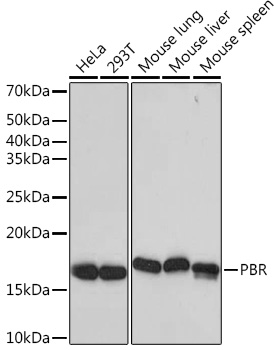Cell Biology Antibodies 17
Anti-PBR Antibody (CAB4881)
- SKU:
- CAB4881
- Product Type:
- Antibody
- Reactivity:
- Human
- Reactivity:
- Mouse
- Host Species:
- Rabbit
- Isotype:
- IgG
- Research Area:
- Cell Biology
Description
| Antibody Name: | Anti-PBR Antibody |
| Antibody SKU: | CAB4881 |
| Antibody Size: | 20uL, 50uL, 100uL |
| Application: | WB IHC IF |
| Reactivity: | Human, Mouse |
| Host Species: | Rabbit |
| Immunogen: | A synthesized peptide derived from human PBR |
| Application: | WB IHC IF |
| Recommended Dilution: | WB 1:500 - 1:2000 IHC 1:50 - 1:200 IF 1:50 - 1:200 |
| Reactivity: | Human, Mouse |
| Positive Samples: | HeLa, 293T, Mouse lung, Mouse liver, Mouse spleen |
| Immunogen: | A synthesized peptide derived from human PBR |
| Purification Method: | Affinity purification |
| Storage Buffer: | Store at -20'C. Avoid freeze / thaw cycles. Buffer: PBS with 0.02% sodium azide, 0.05% BSA, 50% glycerol, pH7.3. |
| Isotype: | IgG |
| Sequence: | Email for sequence |
| Gene ID: | 706 |
| Uniprot: | P30536 |
| Cellular Location: | |
| Calculated MW: | 18kDa |
| Observed MW: | 18KDa |
| Synonyms: | BPBS, BZRP, DBI, IBP, MBR, PBR, PBS, PKBS, PTBR, mDRC, pk18 |
| Background: | Present mainly in the mitochondrial compartment of peripheral tissues, the protein encoded by this gene interacts with some benzodiazepines and has different affinities than its endogenous counterpart. The protein is a key factor in the flow of cholesterol into mitochondria to permit the initiation of steroid hormone synthesis. Alternatively spliced transcript variants have been reported; one of the variants lacks an internal exon and is considered non-coding, and the other variants encode the same protein. [provided by RefSeq, Feb 2012] |
| UniProt Protein Function: | TSPO: Responsible for the manifestation of peripheral-type benzodiazepine recognition sites and is most likely to comprise binding domains for benzodiazepines and isoquinoline carboxamides. May play a role in the transport of porphyrins and heme. Plays a role in the transport of cholesterol across mitochondrial membranes in steroidogenic cells. Belongs to the TspO/BZRP family. Interacts with BZRAP1. May interact with STAR. Interacts with MOST-1. 2 isoforms of the human protein are produced by alternative splicing. |
| UniProt Protein Details: | Protein type:Mitochondrial; Receptor, misc.; Membrane protein, integral; Apoptosis; Membrane protein, multi-pass Chromosomal Location of Human Ortholog: 22q13.31 Cellular Component: cytoplasm; integral to membrane; intracellular membrane-bound organelle; mitochondrial outer membrane; mitochondrion; nuclear membrane Molecular Function:androgen binding; benzodiazepine receptor activity; cholesterol binding; protein binding Biological Process: adrenal gland development; aging; anion transport; apoptosis; axon regeneration in the peripheral nervous system; behavioral response to pain; cell proliferation; chloride transport; glial cell migration; heme biosynthetic process; lipid transport; negative regulation of nitric oxide biosynthetic process; negative regulation of protein ubiquitination; negative regulation of tumor necrosis factor production; positive regulation of apoptosis; positive regulation of calcium ion transport; positive regulation of mitochondrial depolarization; protein targeting to mitochondrion; regulation of cholesterol transport; regulation of steroid biosynthetic process; response to drug; response to manganese ion; response to progesterone stimulus; response to testosterone stimulus; response to vitamin B1; steroid biosynthetic process; steroid metabolic process |
| NCBI Summary: | Present mainly in the mitochondrial compartment of peripheral tissues, the protein encoded by this gene interacts with some benzodiazepines and has different affinities than its endogenous counterpart. The protein is a key factor in the flow of cholesterol into mitochondria to permit the initiation of steroid hormone synthesis. Alternatively spliced transcript variants have been reported; one of the variants lacks an internal exon and is considered non-coding, and the other variants encode the same protein. [provided by RefSeq, Feb 2012] |
| UniProt Code: | P30536 |
| NCBI GenInfo Identifier: | 313104268 |
| NCBI Gene ID: | 706 |
| NCBI Accession: | P30536.3 |
| UniProt Secondary Accession: | P30536,Q53Y59, Q6ICF9, Q96TF6, |
| UniProt Related Accession: | P30536 |
| Molecular Weight: | 10,537 Da |
| NCBI Full Name: | Translocator protein |
| NCBI Synonym Full Names: | translocator protein |
| NCBI Official Symbol: | TSPO |
| NCBI Official Synonym Symbols: | DBI; IBP; MBR; PBR; PBS; BPBS; BZRP; PKBS; PTBR; mDRC; pk18 |
| NCBI Protein Information: | translocator protein |
| UniProt Protein Name: | Translocator protein |
| UniProt Synonym Protein Names: | Mitochondrial benzodiazepine receptor; PKBS; Peripheral-type benzodiazepine receptor; PBR |
| UniProt Gene Name: | TSPO |
| UniProt Entry Name: | TSPOA_HUMAN |







